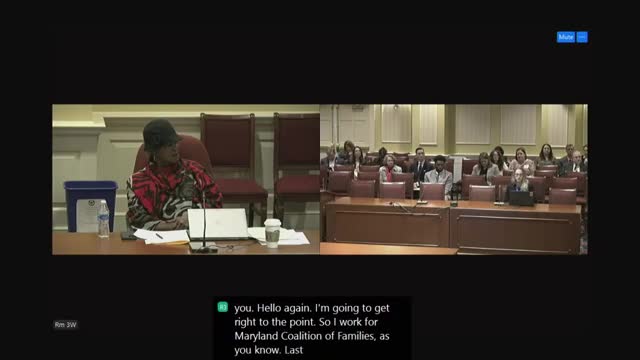Advocates ask Senate to make Access to Counsel funding permanent after evaluation shows savings
Get AI-powered insights, summaries, and transcripts
Subscribe
Summary
Supporters urged the Senate Budget and Taxation Committee to approve making a $14 million annual contribution to the Access to Counsel and Evictions program permanent, citing an evaluation that found the program saves the state roughly $4 for every $1 spent and prevented thousands of evictions.
Legal-aid representatives and state officials urged the Senate Budget and Taxation Committee to make the $14 million annual contribution to Maryland’s Access to Counsel and Evictions (ACE) program permanent, and to sunset the task force that guided implementation after the program reaches full implementation.
Shelley Hettleman and leaders of legal-aid organizations described the program’s early results as “transformational.” Maryland Legal Services Corporation reported that in 2024 it closed over 9,000 ACE cases, secured roughly $650,000 in awards owed to tenants and avoided more than $6 million in improper liabilities for clients. An independent evaluation released by MLSC and partners found a fiscal return to the state of roughly $4 saved for each $1 invested; MLSC cited an estimated $46.7 million in state fiscal savings in 2024 tied to the program.
Witnesses stressed ACE’s equity impacts: the program served tenants who are disproportionately Black and single parents, and more than 80% of people who sought to stay in their homes did so or avoided disruptive displacement after representation. Advocates said evictions have wide consequences including homelessness, worse educational outcomes for children, and higher health and social costs, and that preventing eviction generates savings to the state and localities.
The bill before the committee would provide a durable funding source by directing unclaimed-property settlement funds to the ACE special fund in perpetuity and would terminate the ACE task force in January 2026 after the program completes implementation and the final report is issued. The Office of the Attorney General and the task force testified in support and said they view the program as cost-saving, equitable and procedurally beneficial to the courts.
Supporters asked the committee for a favorable report so the program can continue at scale and avoid service interruptions; MLSC and the Access to Justice Commission emphasized statewide judicial efficiency and long-term cost savings in testimony.
